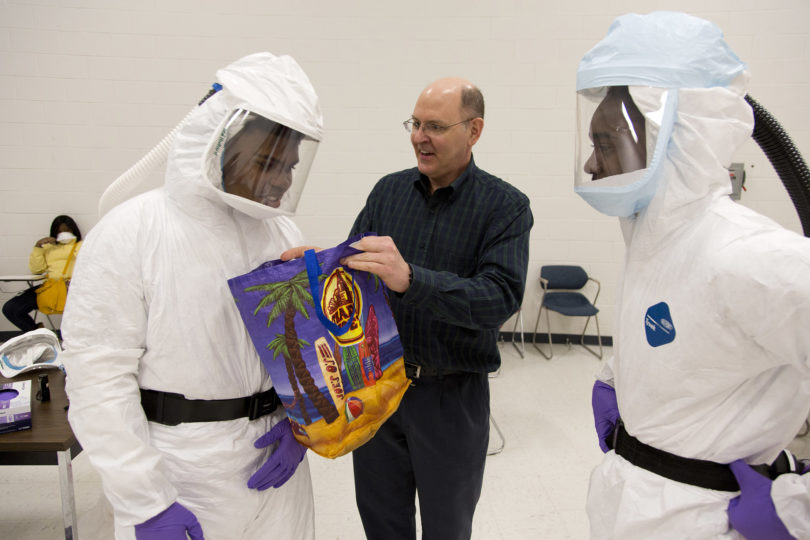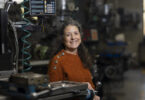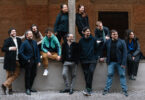Byron Spraggins and Gemerious Smith, 15-year-old ninth-graders at Clarke Central High School, looked like astronauts as they walked around a room at Riverbend Research Lab South wearing full-bodied white impervious suits with mechanical respirators.
This was like no other field trip they had been on before.
The students were trying on suits designed to protect researchers from infectious diseases during lab work. Russell Karls, an associate research scientist in infectious diseases in the College of Veterinary Medicine, brought a foul smelling substance near their masks and asked if they could smell it.
Thanks to the respirator attached to the suit, they could not smell anything but fresh air.
After taking off the equipment, Spraggins said there was something transformative about wearing the suit.
“I got to have the experience that scientists have,” he said. “It made me feel like a scientist.”
Spraggins and Smith were two of the 270 Clarke Central High School students who visited UGA Feb. 24 for a field trip built around visiting faculty, staff and students involved in biosciences research. The ninth-grade class from Cedar Shoals High School visited March 3.
For some students, like Spraggins, it was their first time on a college campus.
A field trip was part of Experience UGA, an initiative to bring Clarke County School District’s students to UGA’s campus, boost the students’ learning experience and promote the value of a college education.
Experience UGA is a partnership between the College of Education’s Office of School Engagement, the Clarke County School District and the UGA Office of Service-Learning-which is jointly supported by the Offices of the Vice President for Instruction and the Vice President for Public Service and Outreach. The nonprofit agency Family Connection-Communities in Schools of Athens also participates in the initiative.
In its inaugural year, Experience UGA will host nearly 5,000 Clarke County students from seven grade levels for field trips sponsored by a variety of academic departments and public service units across campus.
Founding sponsors of Experience UGA are the Office of the Vice President for Public Service and Outreach, the College of Education, the Office of the Vice President for Instruction and the President’s Venture Fund. Funding for these trips was provided by the Office of the Vice President for Research and the dean’s office in the Franklin College of Arts and Sciences.
Provost Pamela Whitten welcomed the students to UGA and encouraged them to use the visit to figure out their interests.
“This is your chance to take a breath and look around today and throughout high school,” Whitten said. “Keep your eyes open. What do you see that you didn’t know existed that interests you?”
On this particular field trip, the students got to see firsthand how biological research is conducted and how college students at a research university can get involved in the process. Students broke into smaller groups to visit labs like Karls’ in multiple units and colleges with the opportunity for hands-on learning with research equipment.
Like Spraggins, the students could get a feel for what it is like to be a scientist.
Since this particular trip focused on biosciences, Whitten told the students about the varied career opportunities for people who study these fields, including in nutrition, health care, veterinary medicine and environmental sciences.
“There is so much you can do with knowledge in these fields,” she said. “Certainly there are careers that will exist in eight or 10 years when you finish college that don’t even exist today. That’s how fast the world is actually changing.”
Philip D. Lanoue, Clarke County School District superintendent, challenged the students to use this trip as an opportunity to begin preparing for college.
“See for yourself where you could be in four years,” he said. “If you want it, you can get it.”







